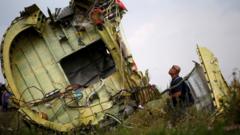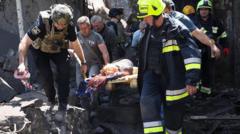A recent ruling by the UN's aviation body officially attributes the 2014 downing of Malaysia Airlines flight MH17 to Russia's failure to comply with international legal standards, reigniting discussions about accountability and reparations.
Russia Held Accountable for MH17 Tragedy, UN Agency Declares

Russia Held Accountable for MH17 Tragedy, UN Agency Declares
The International Civil Aviation Organization concludes Russia's violation of international air law led to the downing of flight MH17.
In a decisive ruling, the International Civil Aviation Organization (ICAO), a United Nations entity, has determined that Russia bears responsibility for the tragic downing of Malaysia Airlines flight MH17, which occurred over Eastern Ukraine in July 2014. All 298 passengers and crew members aboard the flight from Amsterdam to Kuala Lumpur lost their lives when the plane was struck by a missile of Russian origin. The Kremlin has consistently denied any involvement in the incident, despite mounting international pressure and evidence to the contrary.
On Monday, ICAO's council concluded that Russia had not fulfilled its obligations under international air law, which mandates that states must abstain from using weapons against civil aircraft in flight. This ruling finds its origins in a case initiated by Australia and the Netherlands in 2022—both countries were significantly affected by the tragedy, with the majority of the deceased being Dutch nationals.
Australian Foreign Minister Penny Wong responded to the ruling by calling on Russia to acknowledge its responsibility for this act of violence and to provide reparations. Meanwhile, Dutch Foreign Minister Caspar Veldkamp characterized the decision as an important advancement toward establishing truth and securing justice and accountability. He emphasized that this serves as a reminder to the global community that nations cannot act with impunity while violating international law.
Prior legal proceedings reached a similar conclusion when a Dutch court determined that a Russian-backed militia was responsible for the airplane’s demise. In absentia, three individuals—including Russians and a pro-Moscow Ukrainian—were convicted of murder, receiving life sentences; however, they have not yet faced imprisonment due to their absence.
This incident continues to resonate profoundly, with families and communities still grappling with the aftermath a decade later. As calls for accountability intensify, the ICAO ruling highlights the ongoing international discourse regarding state responsibility and humanitarian law in conflict scenarios.




















